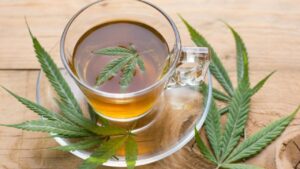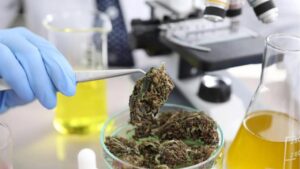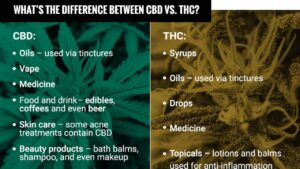As the quest for alternative health solutions grows, cannabis-derived products have gained immense popularity. Key compounds within cannabis offer distinct properties and effects. This article explores their differences and potential advantages.
What is CBD?
- CBD, short for cannabidiol, is one of the many naturally occurring compounds in the cannabis plant.
- Unlike THC, CBD is non-intoxicating, meaning it doesn’t produce the “high” associated with cannabis use.
- CBD interacts with the body’s endocannabinoid system, helping to maintain balance and overall well-being.
- It has become known for its possible therapeutic benefits, such as its capacity to ease stress, ease pain, and encourage relaxation.
Potential Benefits of CBD
- Anxiety relief: CBD has shown promise in reducing anxiety symptoms and helping individuals manage stress.
- Pain management: Many people turn to CBD for its analgesic properties, finding relief from chronic pain conditions.
- Sleep improvement: CBD may support healthy sleep patterns and assist individuals in achieving a restful night’s sleep.
- Anti-inflammatory effects: CBD has been found to possess anti-inflammatory properties, potentially aiding in managing inflammation-related conditions.
Potential Effects of THC
- Psychoactive effects: THC is known for its ability to induce a “high” or altered state of consciousness.
- Increasing appetite: Also known as the “munchies,” THC can stimulate appetite and enhance the enjoyment of food.
- Pain relief: THC has analgesic properties and is often used to alleviate discomfort caused by certain conditions.
- Relaxation and euphoria: THC can promote relaxation and induce happiness and euphoria.
How We Vet Brands and Products
 A critical concern is ensuring the safety and efficacy of brands and products in the ever-expanding market. To vet brands and products effectively, a comprehensive approach is necessary. This typically involves thorough research, quality testing, and compliance with regulations.
A critical concern is ensuring the safety and efficacy of brands and products in the ever-expanding market. To vet brands and products effectively, a comprehensive approach is necessary. This typically involves thorough research, quality testing, and compliance with regulations.
Research
We begin by researching the brand’s reputation and history. This includes examining their manufacturing processes, sourcing ingredients, and any previous recalls or quality issues.
Chemical Composition:
-
- CBD is one of over 100 cannabinoids found in the cannabis plant. It is non-psychoactive, meaning it does not produce the “high” associated with Marijuana use.
- THC is another cannabinoid found in cannabis, known for its psychoactive properties. It’s responsible for the euphoric or intoxicating effects commonly associated with marijuana.
Psychoactive Effects:
-
-
- CBD: CBD doesn’t cause a high that is psychoactive.
- THC: THC is the chemical in cannabis that gives it its intoxicating properties. It can induce altered perception, euphoria, and changes in sensory perception, which can be both enjoyable and, for some, undesirable.
-
Legal Status:
-
- CBD: In many parts of the world, CBD is legal and widely available, often derived from hemp plants with low THC content. Laws regarding CBD vary by region, so it’s essential to check local regulations.
- THC: The legality of THC depends on the jurisdiction. In some places, it is fully legal for recreational and medicinal use, while in others, it remains strictly controlled or prohibited.
Medical Applications:
-
- CBD: CBD has gained recognition for its potential therapeutic applications, such as alleviating anxiety, reducing seizures in certain epilepsy disorders, managing pain, and supporting overall well-being.
- THC: THC also has medical uses, particularly in pain management, nausea and vomiting relief, appetite stimulation (for conditions like cancer or AIDS), and muscle spasm control.
Side Effects:
-
- CBD: There have been few reports of negative effects, and CBD is often well tolerated. Some individuals may experience mild side effects like dry mouth, dizziness, or changes in appetite.
- THC: THC can lead to side effects such as impaired coordination, memory and cognitive deficits, anxiety, and paranoia, especially at higher doses.
Drug Testing:
-
- CBD: While pure CBD products contain minimal to no THC, some full-spectrum CBD products may contain trace amounts of THC. However, it’s unlikely to result in a positive drug test.
- THC use can lead to positive drug test results, as standard drug tests typically screen for THC metabolites.
Third-party Testing
 Independent third-party testing is crucial when it comes to THC vs. CBD. What Makes a Difference? Brands should provide certificates of analysis (COA) from reputable labs, verifying the contents and purity of their products.
Independent third-party testing is crucial when it comes to THC vs. CBD. What Makes a Difference? Brands should provide certificates of analysis (COA) from reputable labs, verifying the contents and purity of their products.
This helps confirm the absence of harmful contaminants like pesticides, heavy metals, and solvents.
Transparency
Brands that are open about their sourcing, extraction methods, and quality control measures are more likely to be trustworthy. We prioritize companies that provide clear and accessible information to consumers.
Legal Compliance
Ensuring that brands and products comply with local and national regulations is essential. Legal compliance adds another layer of safety for consumers.
Expert Consultation
Consulting with experts in the field, such as healthcare professionals or scientists, can provide valuable input on the safety and effectiveness of a product.
By combining these methods, we aim to provide consumers with reliable information to make informed choices when selecting CBD and THC products.
CBD vs. THC: Chemical Structure
 CBD (Cannabidiol): 21 carbon atoms, 30 hydrogen atoms, and 2 oxygen atoms comprise CBD’s chemical makeup.
CBD (Cannabidiol): 21 carbon atoms, 30 hydrogen atoms, and 2 oxygen atoms comprise CBD’s chemical makeup.- THC (Tetrahydrocannabinol): THC has a similar chemical structure to CBD, with 21 carbon atoms and 30 hydrogen atoms, but it contains an additional element – a central ring with a pentagon structure. This structural difference is responsible for its psychoactive effects.
Is CBD as Powerful as THC?
CBD and THC have different effects due to their interaction with the endocannabinoid system. While both have therapeutic potential, they exert their power in distinct ways:
- CBD is not as powerful in producing euphoric or psychoactive effects as THC.
- On the other hand, THC is known for its psychoactive effects and is more potent in this regard. It can induce euphoria, altered perception, and relaxation but can also lead to side effects like anxiety and paranoia.
The “power” of each compound depends on the desired outcome. CBD’s non-intoxicating nature makes it a preferred choice for medical purposes where psychoactivity is undesirable. However, THC’s potency may benefit certain conditions, such as pain management and appetite stimulation.
CBD vs. THC: Legality
- CBD: CBD extracted from industrial hemp with less than 0.3% THC is allowed in many regions worldwide. However, regulations can vary significantly. Therefore, examining local rules and regulations is crucial before buying or utilizing CBD products.
- THC: THC’s legality largely depends on whether it is for recreational or medical use. In some regions, recreational THC use is legal; in others, it remains strictly regulated or prohibited. Medical THC use is legal in several places with varying degrees of accessibility and regulation.
Before using CBD or THC products, always check your local laws and regulations to be sure you comply.
CBD vs. THC: Medical Benefits
Both CBD and THC offer potential medical benefits, but their effects differ:
- CBD vs THC, Unveiling the Key Differences
- CBD vs THC, Understanding the Contrast
- CBD vs THC, Exploring the Variances
- CBD vs THC, Delving into the Distinctions
- CBD vs THC, Distinguishing Between the Two
CBD:
- Potential for anxiety and stress relief.
- It may help manage epilepsy and seizures.
- Anti-inflammatory properties.
- Pain management without psychoactive effects.
- Potential for treating certain neurological disorders.
 THC:
THC:
- Effective pain management, especially for chronic conditions.
- Appetite stimulation is beneficial for conditions like cancer-induced anorexia.
- Relaxation and euphoria can alleviate symptoms of certain mood disorders.
Customer Reviews
 Analyzing customer feedback and reviews can offer insights into a brand’s performance and customer satisfaction. We take into account both good and negative feedback while making judgments.
Analyzing customer feedback and reviews can offer insights into a brand’s performance and customer satisfaction. We take into account both good and negative feedback while making judgments.
Key Differences between CBD and THC
- Effects on the mind: THC is psychotropic and can affect cognitive abilities, whereas CBD has no such effects.
- Legal status: According to federal law, CBD extracted from hemp with less than 0.3% THC is allowed in the United States. Whereas THC remains illegal.
- Medical applications: CBD has gained recognition for its potential therapeutic properties, while THC is primarily used medicinally in states where it is legal.
- Side effects: CBD is generally well-tolerated, with mild potential side effects, whereas THC can have stronger psychoactive effects and may cause anxiety or paranoia in some individuals.
- Drug testing: CBD is less likely to result in a positive drug test, as THC is the compound typically detected in standard tests.
Choosing CBD or THC
- Before deciding whether to choose CBD or THC products, it’s essential to consider your individual needs, lifestyle, and legal obligations.
- CBD is a popular choice for those seeking non-intoxicating relief from various ailments. At the same time, THC may be more suitable for individuals in states where marijuana is legal and looking for psychoactive effects.
- You can choose the best product for your unique needs with a healthcare expert or educated dispensary personnel.
Conclusion
In the world of Marijuana, CBD and THC stand out as two distinct compounds with contrasting effects on the mind and body.
CBD offers a non-intoxicating solution for those seeking potential therapeutic benefits without the psychoactive effects, while THC provides a more euphoric and cognitive-altering experience.
Understanding the differences between THC and CBD is vital in making informed decisions about Marijuana-based products and finding the appropriate remedy for your unique needs.







